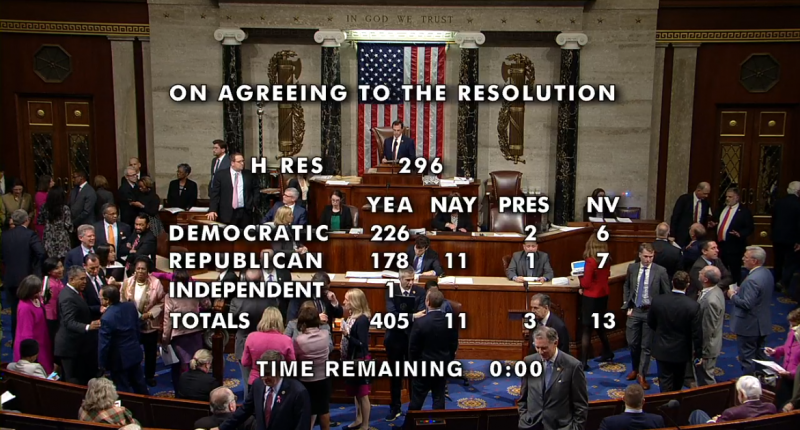Below is Zoryan Institutes’s evaluation on the passage of Armenian Genocide Resolution.
Resolution 296, a remarkable achievement. The overwhelmingly positive vote is a statement in and of itself. Held in the United Stated House of Representatives on October 29, 2019, saw —405 for and 11 against.
What is the significance of the House passing this Resolution? What factors must we consider when digesting this consequential vote? The preamble to this “Resolution Affirming the United States Record on the Armenian Genocide” acknowledges previous, long, official US engagement with the Genocide and goes on to make three specific commitments:
- Commemorate the Armenian Genocide through official recognition and remembrance;
- Reject efforts to enlist, engage, or otherwise associate the United States Government with denial of the Armenian Genocide or any other genocide; and
- Encourage education and public understanding of the facts of the Armenian Genocide, including the United States role in the humanitarian relief effort, and the relevance of the Armenian Genocide to modern-day crimes against humanity.
37 years of careful academic work at the Zoryan Institute, documenting, analyzing, publishing, and teaching about the incontestability of the Armenian Genocide, we recognize that this Resolution is an important step towards bringing the United States on the right side of history. Yet, due to all the past disappointments in this regard, there is some reason for skepticism.
The overt political leverage, and aggressive behind-the-scenes influence of Turkey have been very effective up to now. So why did the House of Representatives pass such a Resolution at this time? When we know, as suggested by Samantha Power, in her new book, The Education of an Idealist: A Memoir, that candidate Obama promised to officially recognize the Genocide in 2008, but once president, was constrained from doing so by his cadre of advisers.
It has been suggested that the House vote is a reaction to Turkey’s recent assault on the Kurds in northern Syria, allies of the United States fighting ISIS. Moreover, could the passing of the Resolution be a message to President Trump, after his decision to bow down to Turkey and pull United States forces out of Syria, betraying the Kurds.
For one, could it be a slap on the wrist for Turkey, a NATO ally, over it’s $2 billion USD agreement with Russia for the delivery of the S-400 air defense system units in 2017. Or further, could it be a response to Turkey’s progression with its relationship with Russia through the movement of troops and trade? Lastly, despite displeasure in the legislative body from both parties, is it because President Trump did not hold the economic sanctions placed on Turkey for very long?
The fate of the Resolution will become clearer as it faces a vote in the Senate as S. Res. 150, and the subsequent confirmation by President Trump. The senate resolution has 20 co-sponsors, 18 Democrat and 2 Republican. These numbers do not suggest bi-partisan support, especially considering Republicans are a majority in the Senate. One can expect that Turkey will pull out all the stops as it threatens, pressures, and cajoles the US government and individual politicians and diplomats, with the assistance of paid lobbyists, as it has successfully done so often in the past. (Turkey is reported to have spent nearly $12 million on lobbying American officials during the first two years of the Trump presidency. (Samantha Power, “A Belated Recognition of Genocide by the House,” The New York Times, Oct. 29, 2019.)
It is our hope that the Senate will follow suit when considering this Resolution, and act in the same overwhelmingly positive manner. Further, we hope our skepticism will prove to be misplaced.
The recognition of the Armenian Genocide by the Senate would first and foremost stand for the truth, so clearly declared in July 1915 by Henry Morgenthau, the then representative of the State Department as the American Ambassador, when he wrote, “… from harrowing reports of eye witnesses it appears that a campaign of race extermination is in progress under a pretext of reprisal against rebellion” (Morgenthau, Henry, Jul. 16, 1915. W.H. Anderson, State Department).
This would, amongst other things, represent a step towards reconciliation with its own citizens, especially those of Armenian extraction, for whom neglect and/or denial of the Genocide has been extremely painful. Further, for the descendants of the survivors whose trauma and pain has been intergenerational, fueled by continued neglect and/or denial. It is an ethical and moral issue, and political expediency should never be more important to Americans than upholding the truth. Last but not least, recognizing the Armenian Genocide can only bring hope to humanity, that we are able to challenge the forces that commit such atrocities and hopefully be able to help prevent its occurrence, for they will know their acts will not denied.










